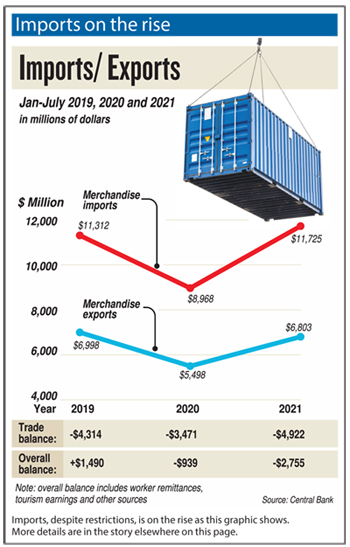Irregular taxes, insider information led to sugar crisis
 A combination of irregular taxes, insider information and lack of legislation to act against importers and wholesalers led to the crisis in the sugar import and sale, according to a study by the Business Times (BT).
A combination of irregular taxes, insider information and lack of legislation to act against importers and wholesalers led to the crisis in the sugar import and sale, according to a study by the Business Times (BT).
While the Consumer Affairs Authority (CAA) introduced a Maximum Retail Price (MRP) of Rs. 85 per kg, the CAA was unable to enforce it as it had authority only against retailers and not importers and wholesalers. Subsequently under recent emergency regulations, the Commissioner General of Essential Services issued a directive for Sathosa to sell sugar at Rs. 122 (white) and Rs. 125 (brown).
The Government has had to forego nearly Rs. 35 billion in revenue since the reduction of the tax to 25 cents from Rs 50 imposed on sugar imports in 2020.
The BT study showed that last year the CAA had, after consultations with importers, wholesalers and retail traders, fixed the price of sugar at Rs.85 per kg. It was made up of Rs.70 +25 cents tax (cost to the importer), importer sells it at Rs. 75 to the wholesaler who in turns sells it to the retailer at Rs.80 which is then sold to the public at Rs.85. However this system collapsed and now Sathosa is selling sugar at Rs.122 (while) and Rs.125 (brown) while the private trade is retailing at Rs.6 more on average.
Here is a timeline of the
developments:
- Former Minister of Finance Mahinda Rajapaksa imposes a tax of Rs. 50 per kg in June 2020 for imported sugar.
- In a bid to reduce prices, on October 13 this tax is reduced to 25 cents by a gazette No 2197/12.
- After several attempts to reduce prices by gazette notifications, the government increased the tax to Rs.40 from 25 cents on October 27. However after mid-November the tax of 25 cents was re-imposed.
- At that time, sugar importers had in their storage around 90,000 metric tonnes of sugar, imported after paying an import tax of Rs 50.
- The increased tax (Rs.50) was to come into force a month later from the date of its introduction. Thereby the revised tax rate could not come into force between October 13 and November 13. After reducing the import tax of sugar to 25 cents the government also set a maximum retail price of Rs. 85 for a kilo of sugar. n During this (one month) period, one sugar importer imported 100,000 metric tonnes of sugar at an import tax of just 25 cents, raising allegations that he was aware that the tax was going to be increased to Rs.50.
- During this period Sathosa purchased over 2000 metric tonnes of sugar at a price ranging Rs.125 and Rs.127 from this ‘specific’ importer even though the retail price was Rs. 85.
- All these details transpired at the Committee on Public Accounts (COPA) hearings after this transaction.
- When details of this sugar transaction were revealed inside and outside parliament, the government took steps to remove the Sathosa Chairman.
- COPA revealed that this deal resulted in the Government being deprived of Rs.16 billion in revenue.
- 584,000 MT of sugar has been imported to the country from October 14, 2020 to June 30, 2021 even though the country’s sugar requirement a month is only 35,000 MT.
- Customs sources accuse this ‘importer’ of having prior knowledge of the tax going up to Rs.50 which would help him to huge profits.
- Since no other sugar importer was able to import sugar so quickly (within one month), the public did not get the benefit of the reduced tax and the sugar was sold at the same high price as before.
- According to Auditor General’s Department, it had already concluded its audit into the alleged “sugar scam” that took place over the last few months and sent a draft report with its findings to the Secretary to the Finance Ministry.
- In March this year, the Finance Ministry announced that the government’s decision to cut the import tax cost it Rs.15.9 billion in tax revenue (January-March 2021). In the subsequent months, the loss to revenue was Rs. 19 billion making it a total of Rs.35 billion the government had to forego in tax revenue.
- Despite excessive stocks, the Government decided to import more sugar, which it planned to retail via state agencies in a bid to stabilise prices.
- The country now has an excess of sugar. Sri Lanka’s average sugar consumption per year is 350,000-400,000 tons.
- It was revealed that from October 14, 2020, to February 20, 2021, the ‘specific’ importer accounted for 39.02 percent of the country’s sugar imports, while six others accounted for 46 percent of the sugar imports.
- On August 31, President Gotabaya Rajapaksa appointed Major General N.D.S.P. Niwunhella as the Commissioner General of Essential Services to coordinate supply of essential food commodities to the people.
- The Government under emergency regulations raided several sugar warehouses with the stocks released to Sathosa which is retailing it at Rs. 122-Rs.125 per kg.
- Some 73 amendments to the Consumer Affairs Authority Act will be tabled in the Parliament soon to close loop holes and increase fines on errant traders to Rs.500,000 from Rs.10,000, State Minister Lasantha Alagiyawanna told the Business Times.


